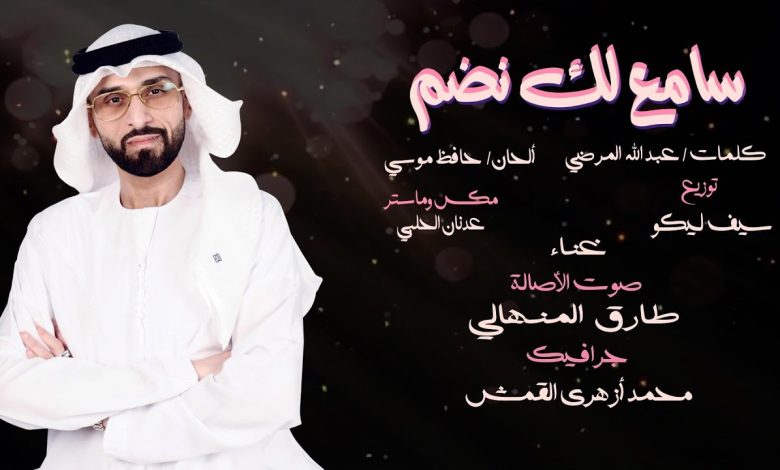The last one is (Sam’lak Nadim)… Sudanese songs with Arabic voices

Sudan Events – Magda Hassan
Emirati artist singer Tariq Al-Menhali’s chant opened debates about Arab artists’ performance of Sudanese songs, especially since in the recent period with the spread of modern media, a number of creative people of different nationalities appeared chanting Sudanese songs. A number of Egyptian singers participated with singers from Sudan, an operetta dealing with the Sudanese war with Sudanese words and melodies.
Wide welcome
The Nubian artist Mohamed Mounir was at the top of the list of singers of Sudanese songs, and he found wide acceptance and welcome in the way he performed my songs (Center of the Circle and Popular Housing). Although the matter was not without some reservations, Mounir followed in singing Sudanese songs, the Kuwaiti band Miami, which sang a number of songs. Sudanese songs were appreciated by young people at the time, although some critics saw that they were deducted from the songs and did not add to them, unlike Mounir, whose proficiency in Sudanese songs was not surprising, as he was a son of Nubian culture and was saturated with everything Sudanese.
Public apology
During this month, a Moroccan artist sang the song (Al Jazeera) by Iman Al Sharif, and she excelled in its feeling and description, and found widespread praise on social networking sites.
Last week, the artist singer Tariq Al-Menhali released the song (I’ll Samalak Nadma), which he had announced to perform last Eid Al-Fitr, but the outbreak of war in Sudan prompted him to publish an apology, announcing that it would be postponed until a later time.
Bold performance
The song, which found wide circulation, was commented on by musician Youssef Al-Mousili, who said that the song did what politics could not do. “I was very surprised by Tariq Al-Menhali in his bold handling of the song (I’ll Call You Nadma). It is a song written by a poet from the Nile River region, and its composer and singer are from the same region.” He added. “It is known that there is There is a genetic relationship between the Sudanese rhythm of the dyloka and some rhythmic types in the Gulf. In terms of pronunciation and the articulation of letters in lyric poetry in northern Sudan, Tariq Al-Menhali excelled to the point of astonishment. In terms of harmony with the pentatonic maqam, there was a harmonic harmony between his voice and the pentatonic and on top of that Al-Menhali searched for the poet and composer and signed a contract with them, as he specializes in the right to second performances.” He added.
Al-Mousili said that what Al-Menhali was able to do in expressing the strength of the relationship between the peoples of the Emirates and Sudan was impossible for politics.
The voice of authenticity
It is noteworthy that Tariq Al-Menhali is the first Emirati academic singer who graduated from the Academy (Beit Al-Arabi Oud – Abu Dhabi) from the Department of Vocals and Research with with honors. His training was supervised by the musician Naseer Shamma, and he was given the nickname (The Voice of Authenticity), due to his high singing abilities and his talents. In addition, he holds a master’s degree in law (intellectual property rights protection) and is finishing his doctoral thesis soon in the same field he loves (media, legal and music).
Difficulty in dealing
Musician Dr. Kamal Youssef, a professor of music, mentioned in an interview with (Al-Ahdath) that he had not yet listened to Al-Minhali’s song. “When the opportunity arises to hear Sudanese song, we find people repeating it, and the last thing was (Al-laila Belail), and before that the Miami band covered the songs (Kida Kida Ya A’Tarala), (Al Lail Al Hadi) and (the middle of the circle). This is in contrast to the songs of the late artist singer Sayed Khalifa (Al Mambo Al Sudani) and (Kaifinafum).” He said
The artist singer Al-Jilani Al-Wathiq believes that the cases are few because there is difficulty in dealing with the Sudanese colloquial language and the difficulty of singing in the pentatonic scale, because the Arabs are accustomed to the Arabic scale in its different positions.
Literary rights
It is noteworthy that (Sam’lak Nadim), the song of the young artist singer Hussein Al-Sadiq, who in 2021 released an album bearing its name. The song is written by the poet Abdullah Al-Mardi, and that Al-Menhali appeared in the song with all its literary rights, especially poetry and melodies.



